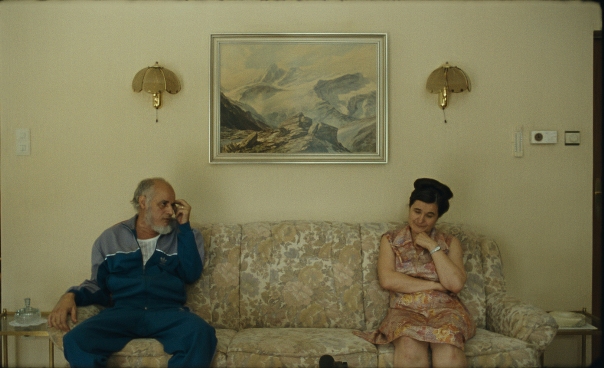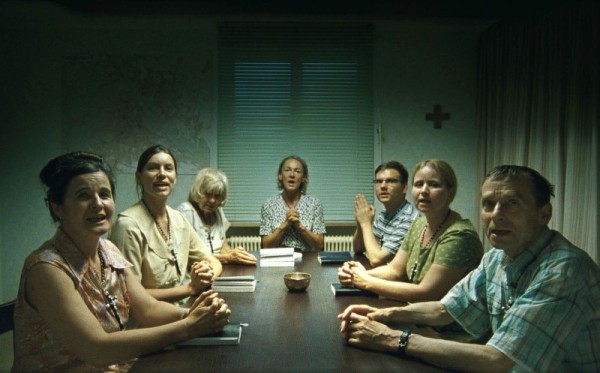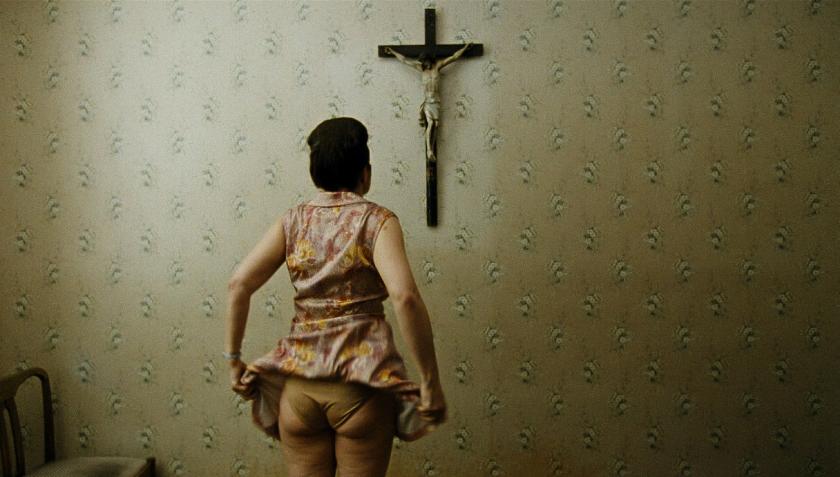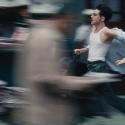What goes on in some homes would scare the sturdiest horse. Take Anna (Maria Hofstatter), whose daily routine might strike some serial killers as pathological. Semi-naked self-flagellation and circuiting the house on bleeding knees is the least of it. “Sexual wildness destroys”, a kitchen homily reminds a woman whose desires are buried in punishing Catholicism. But when paraplegic Muslim husband Nabil (Nabil Saleh, pictured below with Hofstatter) reappears demanding his conjugal rights, anyone’s faith would shake.
Paradise: Faith is the middle film of a trilogy by Austrian director Ulrich Seidl, following last month’s Paradise: Love, in which Anna’s sister Teresa searches for the titular heaven among Kenyan rent boys, and preceding Paradise: Hope, with Teresa’s daughter at a diet camp. Though linked by futile searches for happiness, each works on its own, and is more approachable than you might think.
 The Austrian cinema we see in England is typified by Michael Haneke, or Michael’s cool documenting of the lives of a paedophile and the boy in his basement. Seidl, in these films at least, laces this national taste for dispassionate horror with dark humour, lurid excess and equivocal empathy with his unhappy, unlikeable heroines.
The Austrian cinema we see in England is typified by Michael Haneke, or Michael’s cool documenting of the lives of a paedophile and the boy in his basement. Seidl, in these films at least, laces this national taste for dispassionate horror with dark humour, lurid excess and equivocal empathy with his unhappy, unlikeable heroines.
Hofstatter, who was raised as a deeply repressed Catholic, shows fearsome commitment to a role strung tight with hysteria. Hair and mind yanked back, Anna is crazily brave in inflicting her self-righteous pedantry on strangers whose doors she knocks on, cradling a Virgin Mary statue, a Catholic commando intent on instant conversion (pictured below with fellow evangelists). The totally improvised dialogue Seidl insists on works wonderfully in these scenes, especially when an amiable loner opens the door nude and takes a discursive stab at the Lord’s Prayer, to the exasperation of Maria’s box-ticking, orderly hausfrau notion of salvation. This scene of underplayed hilarity contrasts with Anna’s grapple to part a Russian girl from a beer bottle she seems set to be glassed with. Hofstatter’s commitment is also bruisingly physical.
 Seidl isn’t really interested in religion, anyway, but in what it distracts Anna from with such desperate extremity. Her husband’s useless legs and her Catholic conversion both resulted from some maybe drunken accident two years before, and the real tragicomedy and sadomasochism is in their miserable marriage. The initially sympathetic Nadil first wheedles then assaults for sex, in the sometimes farcical hell they’ve made between them. It’s like Haneke directing Steptoe and Son.
Seidl isn’t really interested in religion, anyway, but in what it distracts Anna from with such desperate extremity. Her husband’s useless legs and her Catholic conversion both resulted from some maybe drunken accident two years before, and the real tragicomedy and sadomasochism is in their miserable marriage. The initially sympathetic Nadil first wheedles then assaults for sex, in the sometimes farcical hell they’ve made between them. It’s like Haneke directing Steptoe and Son.
In the fairy tale-like wooded lane between the train station and home, Anna of course happens on an orgy, part of a nightmare Austria of other people her faith both shields her from, and throws her amongst. When she uses a crucifix to masturbate, it seems more logical than shocking. God is love, after all. And human kinds hurt too much.
Seidl, an ex-documentarian, mostly frames with a static camera, as if dispassionately observing. But his satire and detachment don’t detract from Anna’s credible tragedy, lived by an actress who claws through her director’s restraint.
Watch the trailer for Paradise: Faith















Add comment